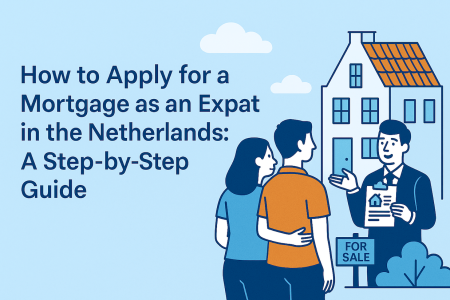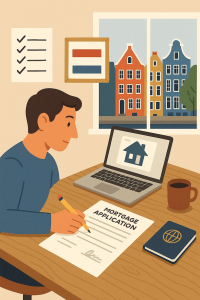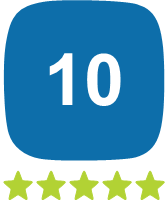
How to Apply for a Mortgage as an Expat in the Netherlands: A Step‑by‑Step Guide
Buying your first home is a major milestone — and even more so when you’re doing it in a new country. As an expat in the Netherlands, the idea of applying for a mortgage might seem overwhelming at first. Different rules, unfamiliar processes, and financial terms in a new language can quickly raise questions.
But the truth is: buying a home in the Netherlands as an expat is absolutely possible — with the right support and clear information. In this blog, we guide you step by step through the entire mortgage process. So whether you’re planning to stay for a few years or settle here permanently, you’ll know exactly what to expect — and how to prepare.
Step 1: Check your eligibility
As an expat, the first thing you’ll want to know is whether you can even get a mortgage in the Netherlands. Good news — in many cases, you can. Most banks and lenders will look at a few key factors:
You have a valid residence permit (EU or non‑EU)
You’re officially registered in the Netherlands with a BSN
You earn income in euros (typically from a Dutch employer)
You have a permanent or long-term employment contract — or are self-employed with a track record
You have a stable financial situation without major debts
Some lenders may ask for additional documentation depending on your situation, but expats are generally treated similarly to Dutch residents when applying for a mortgage — especially when guided by a qualified advisor.
Step 2: Understand how much you can borrow
The amount you can borrow in the Netherlands is primarily based on your gross annual income, combined with your monthly financial obligations (such as loans or alimony). Most banks will lend up to 100% of the property’s market value, which is determined by an independent appraiser.
Important factors that influence your borrowing capacity:
Salary (and if applicable, 13th month or holiday allowance)
Type of employment contract (permanent, temporary, or freelance)
Monthly obligations and other debts
Partner’s income (if you buy together)
Currency — income in euros is preferred
Special tax schemes like the 30% ruling may or may not be included
- Salary (and if applicable, 13th month or holiday allowance)
+ Fixed allowances such as housing allowance or car allowance can also be included — if clearly stated in your employment contract.
Before starting your property search, it’s wise to calculate your maximum mortgage — so you’ll know exactly what price range to target.
Step 3: Gather the right documents
To apply for a mortgage in the Netherlands, you’ll need to submit several documents. A good advisor can help you collect and review everything, but here’s what most lenders typically require:
Valid passport or ID
Residence permit (if applicable)
Registration with a Dutch municipality (proof of address)
Recent salary slips (usually the last 3 months)
Employer’s statement (signed by HR or manager)
Employment contract
Recent bank statements
Overview of monthly financial obligations
For self-employed: annual accounts and tax returns (usually 3 years)
The more complete and accurate your file, the faster your application can be processed.
Step 4: Choose the right mortgage type
In the Netherlands, there are two main mortgage types for new buyers:
Annuity mortgage: Your monthly payment stays the same, but in the beginning you pay more interest and less principal. Over time, this shifts.
Linear mortgage: You repay the principal at a fixed rate each month. Your payments gradually decrease over time.
Each option has its pros and cons, depending on your income, how long you plan to stay in the house, and your personal preferences.
You’ll also need to decide on a fixed interest period — this can range from 1 to 30 years. A longer fixed period gives you stability; a shorter one may offer lower rates.
Step 5:
There are more than 30 active mortgage lenders in the Netherlands — including banks, insurers, and pension funds. Each offers slightly different conditions and rates.
This is where a mortgage advisor can make a real difference. Instead of going directly to one bank, an independent advisor compares all lenders for you, based on:
Interest rates
Flexibility (early repayment, portability)
Approval criteria
Processing speed
Customer service quality
The result? A mortgage that doesn’t just look good on paper, but truly fits your financial life and future plans.
Step 6: Final steps before signing

Once your offer on a home is accepted, the final mortgage process begins:
A property valuation (taxatie) is conducted to determine the home’s market value.
A mortgage application is submitted to the lender with all supporting documents.
The lender reviews everything and issues a formal mortgage offer.
You sign the offer, and a notary prepares the final deed of transfer.
On the agreed date, you sign the deed at the notary’s office — and receive the keys to your new home.
In total, the mortgage process from offer to approval typically takes 4 to 6 weeks.
Step 7: What happens after your mortgage is approved?
Even after you’ve moved in, your financial life continues to evolve. Interest rates may drop. You may switch jobs, start a family, or return to your home country. That’s why it’s valuable to work with an advisor who stays in touch — not just during the application, but also in the years that follow.
At Start Goed Hypotheekadvies, we don’t just help you secure the right mortgage — we make sure you truly understand what you’re signing. And when your life changes? We’re here to help you reassess your options.
Why work with Start Goed Hypotheekadvies?
As a trusted, independent mortgage advisor, we specialize in helping expats navigate the Dutch housing market. We speak plain English, take care of all the paperwork, and explain every step clearly — so you can buy your new home with full confidence.
We compare over 30 lenders to find the right fit for your situation, both now and in the future. From the first orientation to years after you’ve moved in, we’re by your side with personal guidance and smart financial advice.
Ready to explore your options?
We offer a free, no-obligation consultation to help you understand your possibilities as an expat. Book your appointment today — and take your first step toward a home in the Netherlands.
👉 Contact us for expert expat mortgage advice — in English, clear, and completely tailored to you.



